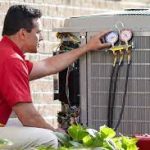What to Do While Waiting For Longmont AC Repair
While Waiting For Longmont AC Repair
While waiting for Longmont ac repair, there are things you can do to help keep your home cool. The first thing to do is call the HVAC contractor as soon as you start noticing problems. By doing this you can ensure a technician will arrive at the house soon, which will help prevent any further cooling problems from occurring.
Another thing to do is open the windows and turn on fans. This can help move air around, which will cool down the people in the room. This won’t make the whole home cooler, but it will help.
Finally, if you notice uneven cooling, it could be a sign that the ductwork needs cleaning or insulation. This is something a professional can fix, but it’s also possible the issue could be solved with a different solution, like blackout curtains or a zoning system that regulates temperatures in various rooms. This will save you the hassle of waiting for an ac repair appointment.
As a homeowner in Longmont, Colorado, you may be wondering if the expenses incurred for repairing or maintaining your air conditioning (AC) system are tax-deductible. The answer to this question is not a simple yes or no, as it depends on various factors and the specific circumstances surrounding your AC repairs. In this article, we will explore the key considerations and guidelines related to tax deductions for AC repairs in Longmont.
The tax implications for AC repairs differ between residential properties and rental properties. If you own a residential property that you use as your primary residence, you are generally not eligible for tax deductions on AC repairs. In contrast, for rental properties, where you rent out the space to tenants, repairs and maintenance expenses, including Longmont ac repair, are typically deductible as rental property expenses.

What to Do While Waiting For Longmont AC Repair
Another essential factor that determines whether AC expenses are tax-deductible is the nature of the expense itself. The Internal Revenue Service (IRS) distinguishes between repairs and improvements. Repairs are generally considered deductible because they are considered necessary to maintain the property’s current condition and functionality. On the other hand, improvements that enhance the property’s value or extend its useful life are usually considered capital expenses and are subject to depreciation rather than immediate deductions.
For example, if you repair a faulty component in your AC system, it is likely deductible as a repair expense. However, if you decide to replace the entire AC unit, it would likely be considered an improvement, and the costs would need to be capitalized and depreciated over time.
To be eligible for tax deductions, AC repairs must be considered “ordinary and necessary” expenses. This means that the expense should be common and accepted in the industry and also deemed necessary for the property’s maintenance and operation.
If the AC repair is deemed extravagant or unrelated to the property’s functionality, it may not qualify as an ordinary and necessary expense, and thus, it would not be tax-deductible.